Internship associated with the hospital
At only 20 years old, Nguyen Gia Bao, a 9+3+1 student at Vien Dong College, officially became an employee of the City Children's Hospital (in Ho Chi Minh City) after 4 months of graduation. Not only Bao, 2 other students, Nguyen Phuong Anh (23 years old) and Le Thi Ngoc Han (22 years old), both nursing college students, have just been recruited by the City Children's Hospital.
According to Ms. Phan Thi Le Thu, Vice Principal of Vien Dong College, some hospitals now have many policies to attract human resources. At Children's Hospital 2 or City Children's Hospital, students are recruited while waiting for official degrees.
"The City Children's Hospital also supports 500,000 VND/night shift for interns, sponsors final semester tuition instead of scholarships, or accepts a certificate of program completion instead of requiring a practice certificate immediately. This helps students shorten the time waiting for jobs, reduce financial pressure and quickly enter the labor market," Master Thu informed.
According to Master Thu, major hospitals such as Cho Ray, Nhi Dong 2, Nhi Dong Thanh Pho... often participate in giving feedback on the school's training program. Students must undergo an output test in the form of "running stations" at the hospital, under the supervision of head nurses, before being recognized as graduates. Regarding the practice roadmap, from the end of the first year, students have begun their internship, going through 8 specialties at 8 different hospitals, including the Emergency Resuscitation Department at Cho Ray Hospital, which is considered the most difficult.
The starting salary of nursing students is usually around 9 million VND/month, not including additional income. In particular, the 9+ pathway allows students to study high school and vocational college at the same time, then study an additional year of college, helping to shorten the time and start working early. "This is a big advantage in the context that many people still have the prejudice that "studying 9+ makes it difficult to find a job". In reality, if properly trained, 9+ students are still highly appreciated for their practical skills," added Master Thu.
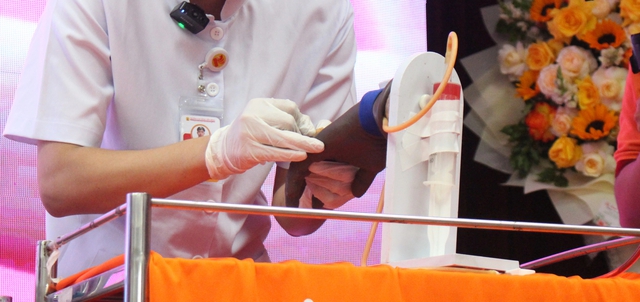
Many nursing college students find jobs in hospitals after internship.
PHOTO: YEN THI
According to Master, Pharmacist Nguyen Minh Luan, Head of the Pharmacy - Nursing Department, Bach Viet Polytechnic College, the nursing training program at the school creates conditions for students to have practical contact. During the 3 years of study, most of the time students are interned at Trung Vuong Hospital. Especially from the second year, they have been attached throughout, thanks to that, students gradually get used to the working environment. Students who are active during the internship are often accepted by the hospital after graduation. In fact, most of the students after graduation find jobs, especially at Trung Vuong Hospital, because they understand and grasp the process and work here.
Master Luan noted another important point is the practice certificate. In the nursing field, after graduation, students are required to have a practice certificate to be officially recruited. If they do not have one, they are only on probation. Particularly at Trung Vuong Hospital, students are exempted from training fees to obtain this certificate, a policy that helps reduce financial burden and create conditions for early job stability.
Ms. Le Thi Bich Thao, Vice Principal of Dai Viet Sai Gon College, also commented that during the internship, good students are often retained to work immediately. This is an advantage that schools with hospital connections bring to students.
Still lacking many skills and style
Dr. Phuong Uyen, head nurse at Cho Ray Hospital, who guides and manages student interns at the hospital, said the difference between learning in the skill lab and the clinical environment is huge. When practicing on the model, everything is “still”, but in reality, patients are very diverse: some are easygoing, some are difficult, some are in pain, some are elderly. It is this complexity that makes students easily confused.
The next difficulty is communication. Some patients cooperate, but others refuse, or initially agree but later become hesitant because they are afraid of pain. Many students lack the skills to negotiate, explain and handle situations, leading to a failure to build trust with patients. Some students are too rigid, thinking that "if you are assigned a patient, you have to do it at all costs", causing the relationship to become tense.
Dr. Uyen frankly pointed out that, in addition to professional skills, professional style is also limited. Despite being reminded, there are still students with prominent dyed hair, long nails or heavy makeup. For patients, especially elderly patients, this image reduces trust and affects professional reputation.
In addition, students often lack confidence when performing techniques on real patients. Without direct guidance, they do not dare to do it; and when there is a supervisor, they lose their composure and tremble. This shows the need for increased psychological training, soft skills, and mentoring support from nursing staff and lecturers.
From this reality, Dr. Phuong Uyen emphasized: nursing training programs not only need to focus on professional skills but also pay special attention to soft skills: communication, situation handling, professional style. When students are both good at their profession and maintain a professional image, they will have the capacity and confidence to work effectively, building trust from patients.
Source: https://thanhnien.vn/sinh-vien-cd-nganh-y-co-viec-lam-sau-tot-nghiep-van-thieu-nhieu-ky-nang-185250920114905986.htm







![[Photo] General Secretary To Lam and National Assembly Chairman Tran Thanh Man attend the 80th Anniversary of the Traditional Day of the Vietnamese Inspection Sector](https://vphoto.vietnam.vn/thumb/1200x675/vietnam/resource/IMAGE/2025/11/17/1763356362984_a2-bnd-7940-3561-jpg.webp)
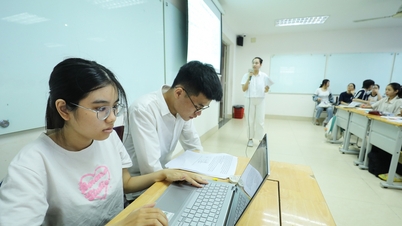












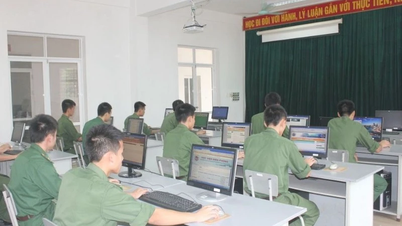





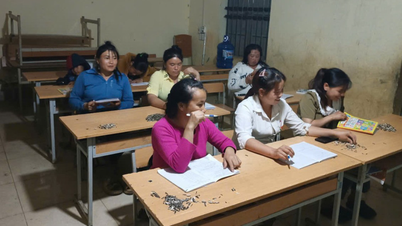





































































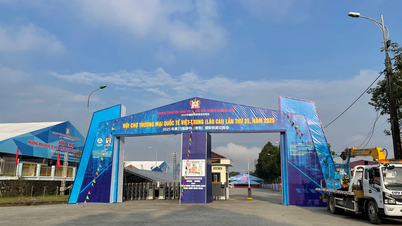













Comment (0)